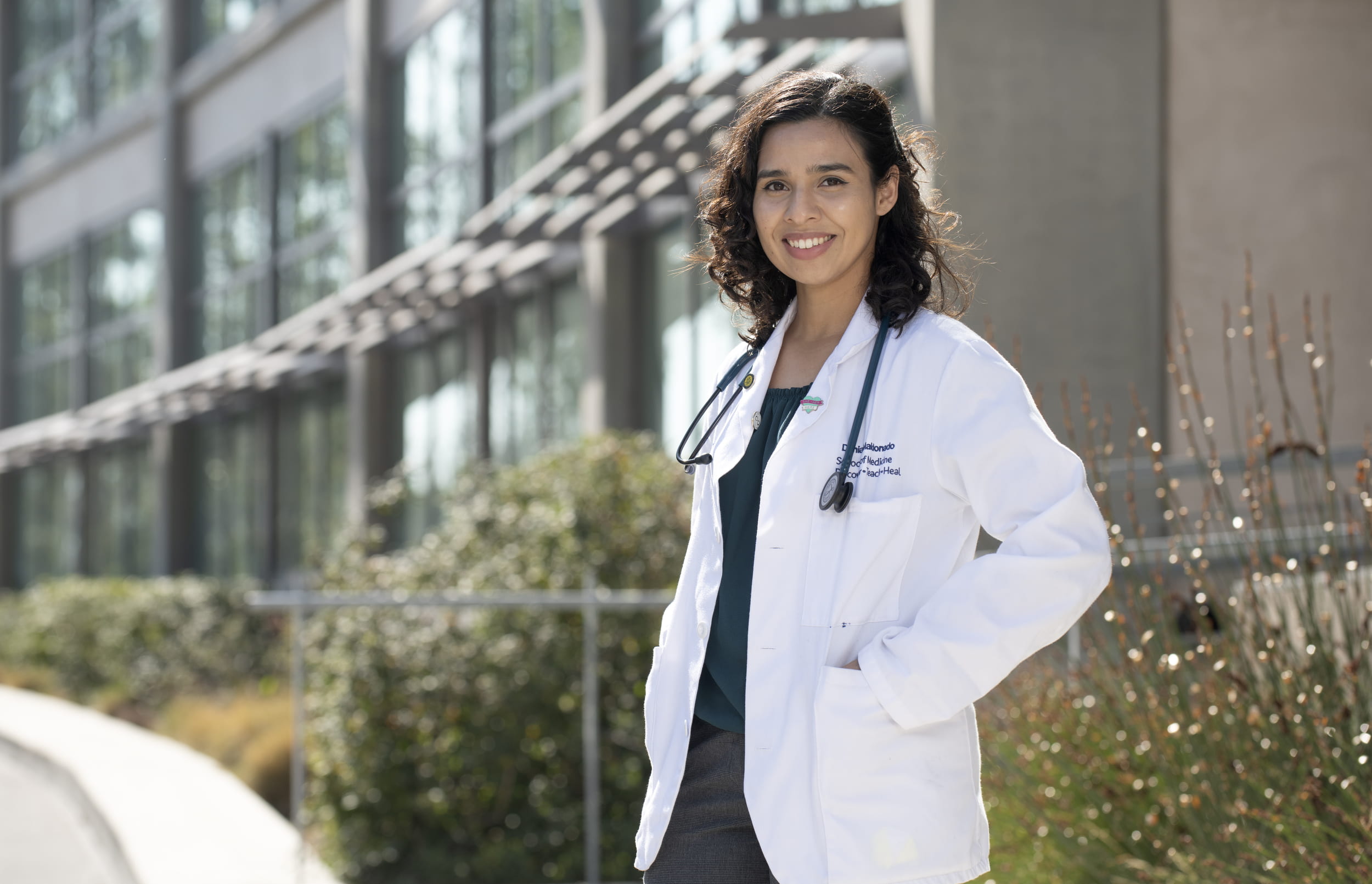Paying it forward through preventive care
First-gen medical student – a fellowship recipient – aims to help the underserved avoid chronic diseases

Dania Maldonado was attending high school in Whittier when her father was diagnosed with Type 2 diabetes. She began to wonder how and why the disease came to afflict her loved one, and her interest in medicine slowly unfurled from there. Fast-forward to the present: Maldonado is now preparing to be a physician in the UCI School of Medicine’s Program in Medical Education for the Latino Community. She plans to specialize in preventive health so she can help vulnerable populations ward off chronic diseases such as diabetes. But her dream wasn’t always so clear.
“When I started college, I knew that I wanted to work with underserved communities because I come from an underserved community. So assisting them was always my passion,” she says. “I just didn’t know how I wanted to work with that population, provide support and give back.”
Maldonado graduated from UC Berkeley with a bachelor’s degree in social welfare. As an undergraduate, she took classes on various social issues and their impact on health. She was also an interpreter for Spanish-speaking participants in a vision lab. Its research focused on how diabetes affects the eyes, piquing Maldonado’s interest, since the topic hit close to home. She gradually gained more skills and began to help with medical tasks. It was a turning point for her.
“The most valuable part of that job was interacting with the participants and educating them on their health,” Maldonado says. “As I translated for them, I learned a lot about how their disease affects their vision. It was the education aspect that made me want to pursue medicine, because I understood that as a physician, you’re not only a provider but also an educator.”
After graduation, she came to UCI as a postbaccalaureate premedical student. This is when Maldonado first became aware of the Program in Medical Education for the Latino Community, in which she could learn how to better address the medical needs of Spanish-speaking people. Now, as a member of PRIME-LC, she’s finding new ways to use her bilingual abilities to empower others.
Maldonado is currently involved in a longitudinal project called Salud Sin Barreras (Health Without Barriers). She and her cohort work with undergraduate premedical organizations that volunteer at free clinics, providing training on Spanish medical terminology. “Even if you grow up as a native Spanish speaker, medical terminology is not something you use every day, so at times it can be difficult to translate a specific word on the spot,” she says.
Mentoring undergrads who are interpreters, just as she once was, is only one example of Maldonado’s eagerness to help those in need. John Billimek, co-director of the PRIME-LC residency track, has seen it firsthand. “In times of crisis, Dania’s first instinct is to reach out to community members, hear their voices and elevate them,” he says. “In 2019, when Central American refugee women lacked medical attention, and in 2020, when Spanish-speaking essential workers in Orange County were hit with COVID-19, she sought out and interviewed the people most affected and shared their perspectives with the healthcare providers who aimed to serve them.” In addition, Maldonado designed a user-friendly COVID-19 resource guide for Santa Ana residents that pointed to testing locations as well as food and housing aid.
At the core of her work is advocacy, and that’s where preventive health comes into play. “Preventive health addresses a lot of chronic illnesses that impact minority populations, especially Latinos. Diabetes and hypertension are common chronic diseases that can be prevented,” Maldonado says. “Patients may have different factors in their lives that hinder them from achieving their health goals. Preventive health can consist of giving a food prescription and holding a fresh food drive. It’s about finding ways for underserved people to have better access to the resources they need to improve their health.”
Earlier this year, Maldonado was named a Lieu Scholar in Medical Leadership, a designation that provides funding for parking, books and food. The fellowship is for talented medical students whose parents never enrolled in postsecondary education. Dr. David Lieu, a 1979 graduate of UCI’s School of Medicine, was a first-generation student himself and understands how monetary barriers can inhibit success. The award has lessened the financial burden on Maldonado, who now has one less worry as she pays it forward.
About UCI’s Brilliant Future campaign: Publicly launched on Oct. 4, 2019, the Brilliant Future campaign aims to raise awareness and support for UCI and UCI Health. By engaging 75,000 alumni and garnering $2 billion in philanthropic investment, UCI seeks to reach new heights of excellence in student success, health and wellness, research and more. Learn more by visiting www.brilliantfuture.uci.edu.